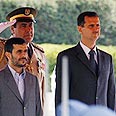
A breakable link?
Despite current alliance, national interests of Syria, Iran not quite the same
While Damascus and Tehran appear to be demonstrating a united front, seeking to strengthen Iran’s expansionism in the Middle East and aggression towards Israel, Israeli government officials were recently reported as commenting that Syria is still not a satellite of Iran and can, in fact, be extricated from an Iranian "bear-hug."
Indeed, closer inspection of Syrian-Iranian relations reveals slight disparities between Iran’s objectives of regional expansionism and the national interests of Syria. With creative leveraging, Israel just might be able to seize upon the opportunity that these rifts provide to dismantle a key link holding the Iranian expansionist project together.
Despite the feeling after the Second Lebanon War that a moderate anti-Iranian axis could be created, recent events seem to indicate that the stock of Iran and its rejectionist allies is rising: Hamas handily defeated Fatah in Gaza, the Saudi Peace Initiative lost momentum, Lebanon remained frozen in a face-off while France appealed to Iran for its resolution, the Bush Administration finally engaged Iran over the future of Iraq, all the while Iran steadily progressed in its nuclear program.
As in Lebanon and Iraq, Iran has an interest in showing that it is inextricably linked to the resolution of key regional conflicts, including those that involve Syria. (This explains the recent reports – true or untrue – of the Syria-Iran strategic military deal.) Since such disputes can apparently not be solved without Iranian cooperation, Iran creates leverage over the international actors involved, such as France or the US, hoping that this will inhibit further international sanctions or a potential military strike against its nuclear program.
Thus, one way to undermine the Iranian expansionist project – whose ultimate goal is a region dominated by fundamentalists and absent of a Jewish state – is to dismantle the links from which Iran derives its immunity.
Cracks in network of resistance?
While Iran has sought to present a united front that includes Syria, a number of potential gaps in each country’s respective national interests tell a slightly different story.
Following the outbreak of the political crisis in Lebanon, Iran coordinated its position with Saudi Arabia and did not give its full backing to Syria over the issue of the international tribunal for the Hariri assassination – indicating a willingness to sideline Syrian interests when Iran needs to protect itself.
Regarding the future of Iraq, Syria has expressed interest in a strong central government in Baghdad with a secular Arab identity, while Iran prefers a weaker, more de-centralized Iraq in which religious Shiites dominate.
Furthermore, Syria’s national interest to negotiate the return of the Golan Heights with Israel fundamentally contradicts Iran’s priority of preventing any political process with Israel.
Removing Syria from Iran’s orbit of influence would be a significant blow to Iran’s aspirations for regional hegemony and immunity for its nuclear program. The key may be to place Syria’s national interests in conflict with Iranian expansionism.
On one hand, as long as Syria continues to facilitate the rejectionist activities of Iran, Hamas and Hizbullah, it should remain isolated from the West, under international pressure concerning Lebanon and wary of the possibility of military action should it provoke Israel.
On the other hand, a tripartite US-Israel-Syria deal – something Assad has hinted at – may be emerging due to a convergence of interests among the three. While Syria wants carrots beyond resolution of its dispute with Israel, such as an end to pressure and isolation led by the US, Syria can actually help the US achieve its primary objective of stabilizing Iraq in addition to ending support for Hamas and Hizbullah and weakening Iran.
Israel may want to explore with the US the potential mutual benefits of containing the expanding Iranian threat by having the road from Damascus to Washington pass through Jerusalem.
The author, John Davis, is an analyst at the Reut Institute










